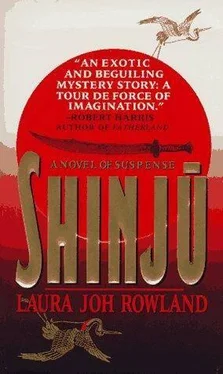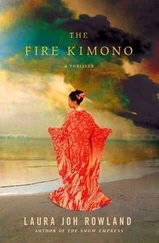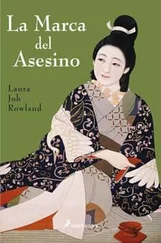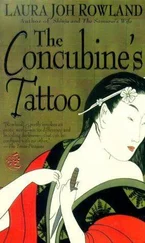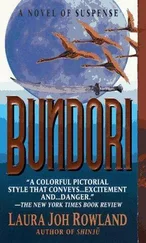Laura Rowland - Shinjū
Здесь есть возможность читать онлайн «Laura Rowland - Shinjū» весь текст электронной книги совершенно бесплатно (целиком полную версию без сокращений). В некоторых случаях можно слушать аудио, скачать через торрент в формате fb2 и присутствует краткое содержание. Жанр: Исторический детектив, на английском языке. Описание произведения, (предисловие) а так же отзывы посетителей доступны на портале библиотеки ЛибКат.
- Название:Shinjū
- Автор:
- Жанр:
- Год:неизвестен
- ISBN:нет данных
- Рейтинг книги:4 / 5. Голосов: 1
-
Избранное:Добавить в избранное
- Отзывы:
-
Ваша оценка:
- 80
- 1
- 2
- 3
- 4
- 5
Shinjū: краткое содержание, описание и аннотация
Предлагаем к чтению аннотацию, описание, краткое содержание или предисловие (зависит от того, что написал сам автор книги «Shinjū»). Если вы не нашли необходимую информацию о книге — напишите в комментариях, мы постараемся отыскать её.
Shinjū — читать онлайн бесплатно полную книгу (весь текст) целиком
Ниже представлен текст книги, разбитый по страницам. Система сохранения места последней прочитанной страницы, позволяет с удобством читать онлайн бесплатно книгу «Shinjū», без необходимости каждый раз заново искать на чём Вы остановились. Поставьте закладку, и сможете в любой момент перейти на страницу, на которой закончили чтение.
Интервал:
Закладка:
“I’ve seen enough,” Sano said. “Thank you for-”
But Dr. Ito didn’t seem to hear. Frowning at Noriyoshi, he said, “Mura- san . Turn him.”
The eta obligingly rolled the body onto its side. Dr. Ito bent over it, scrutinizing the head and neck.
Sano moved closer. Then he caught the body’s odor: a sweet, sickly butcher-shop scent, mixed with the fishy taint of the river. He moved back toward the open window. Ito gestured for the eta to turn Noriyoshi facedown.
“What caused this?” Sano asked, pointing to what looked like a large reddish bruise discoloring Noriyoshi’s back, buttocks, arms, and legs.
“The blood settling after death.” Taking a cloth from inside his coat, Ito covered his hand with it. Then he began to probe Noriyoshi’s head. Despite being a doctor of progressive outlook, he apparently hadn’t overcome his own aversion to the dead.
“Mura- san , a knife and razor,” Ito ordered. Then, to Sano: “There is a flattened spot here at the base of the skull. We shall have a better look at it.”
Sano looked, but saw nothing. He didn’t want to touch the head himself. He waited while Mura cut away a patch of hair and shaved the scalp bare where Ito had pointed. Then he saw the livid purple indentation. He shifted his gaze to Ito’s face and kept it there.
“What caused it? A blow that killed him before he was thrown into the river?”
“Or perhaps a rock or piling that struck him-when he jumped into the river.” Dr. Ito emphasized the last words.”Or during the first hour after death, when a blow could still produce a bruise. It is impossible for me to say. But there is a way to tell if he did drown.”
Sano’s pulse quickened. Instinct told him that a murderer had inflicted Noriyoshi’s wound. He must know for certain. “How?” he asked eagerly.
“If he drowned, he will have water inside him,” Ito answered. “But in order to know that, we must cut him open.”
Sano stared at Ito, appalled. Dissection of a human body, as well as any other procedure even remotely associated with foreign science, was just as illegal as it had been at the time of Ito’s arrest. Perhaps the authorities no longer cared if Ito broke the law, but what about him? If the wrong people found out, he would not only lose his position, he would be banished, never to see his home or family again. He started to protest. But Dr. Ito’s gaze locked with his. freezing him into silence. I risked everything to seek forbidden truths , the shrewd eyes seemed to say. How far are you willing to go ? Sano’s mind recoiled from the unspoken challenge. He tried to conjure up images of his father, of Magistrate Ogyu. He reminded himself of his obligation to them. But instead he saw the doshin ’s assistants beating a helpless beggar. He felt again the elation of the moment when he’d corrected an injustice and set an investigation back on the road to truth.
“All right,” he said.
As soon as the words left his mouth, he realized that he had committed himself to this when he’d agreed to view the body. He’d taken the first step, and there had never been any choice about the second.
At a nod from Ito, Mura went to the cabinet. From it he took a wooden tray of tools-steel saws, long razors, and a collection of knives and instruments such as Sano had never seen before. They must have been Dutch in origin. Mura set the tray on the table beside the body, then went to the cabinet again and brought out a white cloth. This he tied over the lower half of his face.
His practiced movements told Sano that this was not the first dissection ever performed here. As did a bamboo pipe running from a hole in the table down to a drain in the floor. The room had been prepared for Dr. Ito’s experiments.
Mura turned Noriyoshi’s body onto its back. He picked up a slender knife and held it over Noriyoshi’s chest. Apparently he, not Ito, would do the actual cutting. Despite his unconventional views, Ito followed the tradition of letting the eta handle the dead.
Sano watched with horrified fascination as the blade sliced cleanly into Noriyoshi’s skin and moved down the center from the base of the collarbone to the navel.
“No blood?” he asked, relieved to be spared the sight of it. The raw, pink edges of the cut looked bad enough. His heart was racing; his hands went cold and clammy.
“The dead do not bleed,” Dr. Ito replied.
Now Mura made several cuts perpendicular to the first. He inserted a flat-bladed instrument into one of them.
Sano looked at the glistening red tissue that appeared as Mura folded the skin back from Noriyoshi’s rib cage, and at Mura’s slimy hands wielding the instrument to slice it away. He swallowed hard. Nausea spread through his stomach. Sweat trickled down his face despite the cold air coming through the window. His skin crawled. He fought the sickness by trying to concentrate on something else. He couldn’t have Noriyoshi’s corpse exposed to the public; signs of the dissection would show. When he returned to his office, he must issue a cremation order. But the distraction failed. Not wanting to see, yet unable to look away, he watched as Noriyoshi’s innards were revealed. The pale, gleaming ribs with twin pinkish-gray spongy lobes and a red, meaty object beneath. The coiled tubes of viscera showing at the lower edge of the cut. Like a flayed animal, he thought dizzily. And the smell rising from the open cavity was the same, too: sweet, strong, and rotten.
Like other men his age, he’d never gone to war. He knew about its atrocities, of course: men decapitated with a single sword slash, or shot with guns bought from foreign barbarians. Limbs severed. Bodies hacked to bits. He’d read accounts in the history texts and heard the stories handed down from generation to generation. Somehow he’d always imagined the carnage of battle as noble, necessary, and part of a samurai’s domain. This-this cold, deliberate mutilation of a human body-seemed obscene. It was defilement in its worst form. He could feel the pollution staining his skin, seeping into his nostrils, coating his eyeballs. His stomach lurched. Even his sweat seemed contaminated; he couldn’t bring himself to touch it. He pressed his lips together to keep it from running into his mouth.
“Mura- san , the lower two ribs on the right side,” Ito said.
Sano watched as Mura took one rib between the jaws of a sturdy pair of grips. He closed his eyes at the sickening crack of bone- once, twice. When he opened them again, he saw why Mura had covered his face. Bits of red tissue flecked the white cloth just over the eta’s mouth.
“Good.” Ito nodded. “Now cut… there.” He sketched a line in the air above the place where the ribs had been, over the section of spongy lobe now exposed. To Sano he said, “If there is water, it will be in the breathing sacs.”
Sano nodded quickly, afraid that he would vomit if he tried to speak. He watched the thin knife slice the breathing sac and braced himself for the gush of fluid.
It never came. Instead the sac merely shrank a little, like the punctured swim bladder of a fish.
“No water.” A grim satisfaction suffused Dr. Ito’s face. “This man did not drown. He died before he entered the water. He was murdered, then thrown into the river.”
Sano’s vision darkened, and his legs wobbled beneath him. Then he retched.
“ Yoriki Sano- san . Are you ill?”
Sano tried to answer, but bile seared his throat. Without making a proper farewell, he stumbled from the room. He had to get out. Fast.
The jail corridors seemed endless; the prisoners’ cries were the sounds of demons in hell. Somehow Sano made it to the door. He managed to climb onto his horse and get halfway across the bridge. Then his stomach heaved again. Dismounting, he vomited into the canal. But the end to his sickness brought little relief. He felt horribly soiled by his experience. Conscious only of a desire to put as much distance between himself and Edo Jail as possible, he rode blindly through the twilight at a furious gallop.
Читать дальшеИнтервал:
Закладка:
Похожие книги на «Shinjū»
Представляем Вашему вниманию похожие книги на «Shinjū» списком для выбора. Мы отобрали схожую по названию и смыслу литературу в надежде предоставить читателям больше вариантов отыскать новые, интересные, ещё непрочитанные произведения.
Обсуждение, отзывы о книге «Shinjū» и просто собственные мнения читателей. Оставьте ваши комментарии, напишите, что Вы думаете о произведении, его смысле или главных героях. Укажите что конкретно понравилось, а что нет, и почему Вы так считаете.
